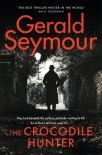The Crocodile Hunter by Gerald Seymour (english novels to improve english txt) 📗

- Author: Gerald Seymour
Book online «The Crocodile Hunter by Gerald Seymour (english novels to improve english txt) 📗». Author Gerald Seymour
Jonas seemed to see an innocence in the eyes.
“There had been talk about a small special formation. You hear that sort of thing all the time, but believe it only when you’re hit and it goes badly. The more élite they are, then the better you feel if your arse is kicked. It was a very committed attack, well planned and well directed. It did the job as intended, and I promise you, Mr Merrick, it takes discipline to retire in good order when that job is done, not to hang about. Singing their praises loudest was that sergeant with the weak bladder.”
And saw the cut of the jaw, its power. Not a man who would take a backward step . . . He had a map laid out in front of him, and had drawn a crude circle around the village and the estate off the Margate road.
“That sort of action is not planned by a committee. There will be one of them and the rest are followers. And then intelligence threw in the name of Kami al-Britani as their chief honcho. We find that successive layers of UK military keep bumping into the sort of people that we would like to have had as our senior non-commissioned officers: very able, think on their feet, those who come out on top of any leadership cadre. Just a pity that he was on the wrong side – and best fought when he is respected.
“I have to hack on, Mr Merrick. Been good to speak . . . Oh, and there was a woman with them . . . You’ll not be surprised if I say my sergeant spoke well of him. Why was his life spared? Can’t say, don’t know, except that he’d have had the union flag stitched to his upper arm. What I do say is that we might have hit him at the right time because in the months ahead they were given a heavy battering. When they were pulling back, they were hassled all the way from the air, especially from the drone attacks. It was awesome, Mr Merrick, the force used against them. Did he survive?”
No answer given.
“If you are interested, does that tell me he’s come home?”
Jonas chuckled softly, was about to ring off.
“Remember what I said about ‘respect’, and remember the pounding they’ve taken. And remember that what they dread most is going in a cage. Good night, Mr Merrick.”
The time for evensong was half past five – the central point in the cathedral’s daily routine. The choir came in procession.
Cammy had once been part of this magnificence. A chosen one. His appearance had once been as theirs was. Faces scrubbed, and hair – always seemed to be blond – tidily cut, immaculately parted. Fingernails short and polished black shoes. A white surplice over a purple robe, and a starched ruff – also white – at the throat. They filed in, took their places beside the block of seats where Cammy was.
Worshippers and tourists were pressed around Cammy.
A young man led them. In Cammy’s day, toward the end of his time, an older man had replaced for a few months the choirmaster who had gone on sick leave, or a sabbatical. The boys called the stand-in “old Fergie”.
He listened. He did not need to open the hymn book, Ancient and Modern: recalled it. Cast Me Not Away, one of his favourites, following only minimally behind the “snares of hell” anthem. A woman beside him, her elbow against his, had closed her eyes, and her lips moved and she had the look on her face of adoration. As Cammy remembered it, reverence and praise were heaped on the young voices, and it was understood that they were unique in the church world of their country, were the best. He had come from the estate on the hill above the village of Sturry, had been pulled out of the local state junior school, had sung in auditions, had heard older men and a woman murmuring, tapping pencils, and scribbling notes, and the letter had dropped through the letterbox. His mother had opened it, had slumped on the stairs, had held the single sheet of paper, half a dozen typed lines on it under the address of the college, and tears had streamed on her face and she had been rendered speechless. His half-brother had cuffed him on the shoulder and had muttered that he had “done well”, which was as good as it would get. His half-sister had pulled a face, had hugged him, and then kissed his cheek, left lipstick there. A new school uniform, fitted for his robes, gone with a cheap suitcase to Choir House where he would be a boarding pupil. His accent different to the other new recruits, and his manners rough, and his discipline lax, but as the months had gone by these were tolerated because of his voice, and his ability to learn, and the thing of beauty that he possessed.
He looked at each of their faces. He estimated which were about to feel the weight of failure, pain of rejection. Their voices soared into the upper arches of the great roof . . . He had





Comments (0)